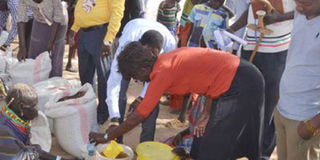Uganda, Kenya on alert as people, livestock starve

Already some communities in Uganda Kenya are feeling the blunt of prolonged droughts. NMG PHOTO | THE EASTAFRICAN
What you need to know:
- In Kenya, where over one million people urgently need food aid, government has warned of widespread crop failure, water scarcity, loss of livestock, malnutrition and disease outbreaks if the rains fail.
Nairobi. More than 10 million people in eastern Africa are at the risk of starving, amid fears that the delay in the onset of the long rains will worsen the current food shortage and cause disease outbreaks.
Uganda, Kenya, South Sudan, Ethiopia and Somalia are already feeling the effects of drought, with deaths of people and livestock reported, and humanitarian organisations warning that the situation will worsen in the coming weeks.
The governments of Uganda and Kenya have already warned that the delay in the the rains, which generally occur between March and May, will cause a significant food shortage with severe ripple effects particularly for communities living in arid and semi-arid areas.
Warned
Recently, the Uganda National Meteorological Authority, warned that the delay in rains might have adverse effects in many parts of the country and the economy at large.
Uganda has since November maintained low inflation due to good and consistent agricultural yields.
Government has also cautioned traders against food exports and told them to sell to areas hit by the drought, particularly the Karamoja region.
“Traders should sell food to areas like eastern and northern Uganda as well as the Karamoja sub-region that do not have food,” said Agriculture state minister Christopher Kibanzanga. The situation is expected to affect households due to skyrocketing food prices, food-instigated inflation and an economic crisis caused by the poor performance of the agricultural sector and the rising food import bill.
In Kenya, where over one million people urgently need food aid, government has warned of widespread crop failure, water scarcity, loss of livestock, malnutrition and disease outbreaks if the rains fail.
Catastrophe
According to humanitarian organisations such as Food Security, Nutrition Working Group and Oxfam, the food insecurity situation in the region is gravitating towards a catastrophe that can only be arrested through early action.
The delay in the start of the March to June long rains, coupled with forecast deficits in April, are building on already dry conditions due to poor October to December rains.




